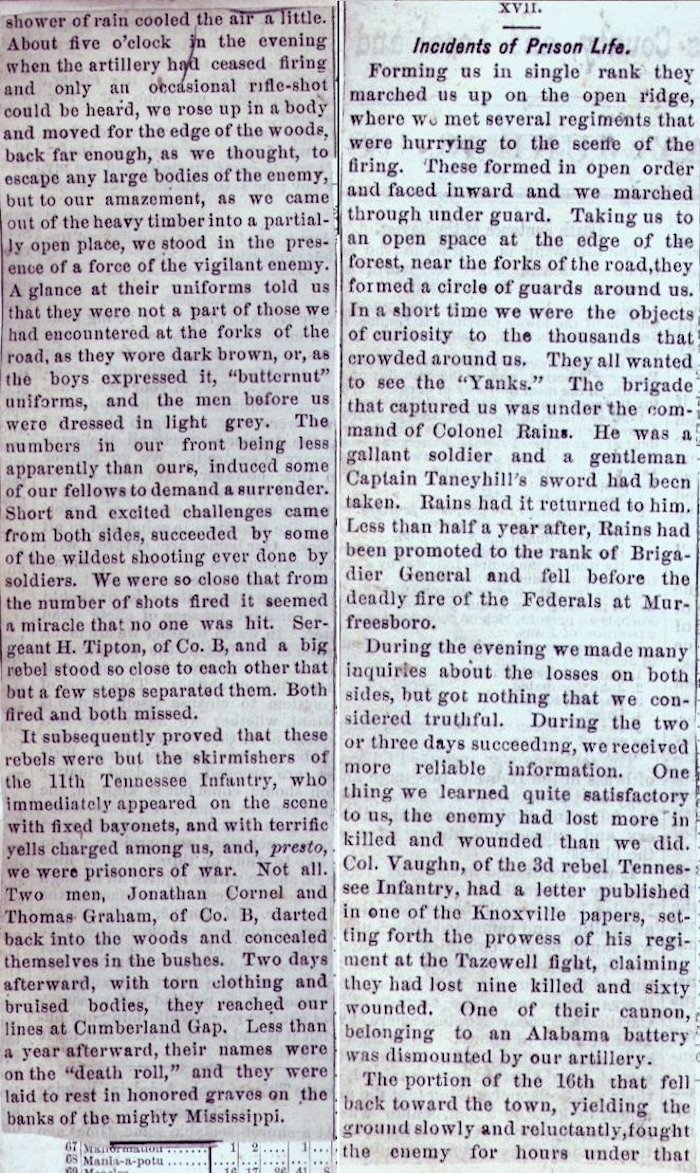| Camp & Field Page 27 | Camp & Field Index Page | 16th OVI Home Page | Camp & Field Page 29 |
The Camp & FieldArticles by Theodore Wolbach |
 Cpl. Theodore D. Wolbach |
The following image is taken from a book titled "Mortality and Statistics of the Census of 1850" in which it is believed retired Captain Rezin H. Vorhes, Company H, pasted over the pages a series of articles written by Cpl. Theodore D. Wolbach, Company E, titled "Camp and Field" and published, by chapter, in the Holmes County (Ohio) Republican newspaper from February 24, 1881 to August 17, 1882. The articles tell the story, in great detail and color, of the 16th OVI, from the inception of the 3-year regiment in October, 1861, through all its camps, battles and marches until it was disbanded on October 31, 1864. The articles pasted in the Vorhes book cover the first 35 chapters, published through October 20, 1881. All the remaining chapters were recently found in a Holmes County library by researcher Rob Garber who obtained copies, performed the transcriptions and provided to this website and which are also presented here, thus providing the complete work by Theodore Wolbach.
Throughout these articles click on the underlined white text for additional details.
The webauthor thanks 16th Ohio descendant Rob Garber for his excellent research on the Camp And Field articles and for performing the tedious digital transcription of those articles found on each page. The transcriptions were made to reflect the original articles verbatim, misspellings and all. Rob is the 3rd great nephew of Capt. William Buchanan, Company F, 16th Ohio, who served in the 90-day regiment as a private, re-enlisting in the three year regiment, and eventually making the rank of Captain of Company F. Thanks Rob!
Page 28 - Chapter 16, 17 - August, 1862
 |
shower of rain cooled the air a little. About five o'clock in the evening when the artillery had ceased firing and only an occasional rifle-shot could be heard, we rose up in a body and moved for the edge of the woods, back far enough, as we thought, to escape any large bodies of the enemy, but to our amazement, as we came out of the heavy timber into a partially open space, we stood in the presence of a force of the vigilant enemy. A glance at their uniforms told us that they were not a part of those we had encountered at the forks of the road, as they wore dark brown, or, as the boys expressed it, It subsequently proved that these rebels were but the skirmishers of the 11th Tennessee Infantry, who immediately appeared on the scene with fixed bayonets, and with terrific yells charged among us, and, presto, we were prisoners of war. Not all. Two men, Jonathan Cornel and Thomas Graham, of Co. B, darted back into the woods and concealed themselves in the bushes. Two days afterward, with torn clothing and bruised bodies, they reached our lines at Cumberland Gap. Less than a year afterward, their names were on the |
Published in Holmes County Republican XVII. Incidents of Prison Life. Forming us in single rank they marched us up on the open ridge, where we met several regiments that were hurrying to the scene of the firing. These formed in open order and faced inward and we marched through under guard. Taking us to an open space at the edge of the forest, near the forks of the road, they formed a circle of guards around us. In a short time we were the objects of curiosity to the thousands that crowded around us. They all wanted to see the During the two or three days succeeding, we received more reliable information. One thing we learned quite satisfactory to us, the enemy had lost more in killed and wounded than we did. Col. Vaughn, of the 3d rebel Tennessee Infantry, had a letter published in one of the Knoxville papers, setting forth the prowess of his regiment at the Tazewell fight, claiming they had lost nine killed and sixty wounded. One of their cannon, belonging to an Alabama battery was dismounted by our artillery. The portion of the 16th that fell back toward the town, yielding the ground slowly and reluctantly, fought the enemy for hours under that |
| Camp & Field Page 27 | Camp & Field Index Page | 16th OVI Home Page | Camp & Field Page 29 |